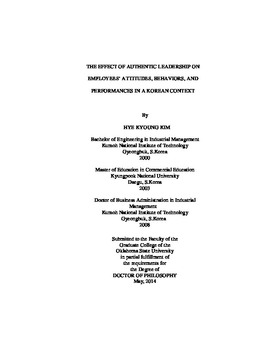| dc.contributor.advisor | Ausburn, Lynna J. | |
| dc.contributor.author | Kim, Hye Kyoung | |
| dc.date.accessioned | 2015-06-17T20:06:34Z | |
| dc.date.available | 2015-06-17T20:06:34Z | |
| dc.date.issued | 2014-05 | |
| dc.identifier.uri | https://hdl.handle.net/11244/14935 | |
| dc.description.abstract | Few empirical studies have been conducted on authentic leadership. The two main purposes of this study were to investigate the roles and effects of authentic leadership in an organization, and to describe its potential linkage to occupational self-efficacy, interpersonal trust, work engagement, and role-based performance. Also, this study intended to validate the measures of these five variables in a Korean context. The unit of analysis was at the level of employees. To achieve research goals, this study employed several statistical techniques such as bootstrapping procedures and structural equation modeling (SEM). A total of approximately 2,500 Korean workers were selected as potential survey participants, and of these, 365 workers participated in the online survey. After screening and deleting missing data and an outlier, a total of 336 cases were included as the final research sample. | |
| dc.description.abstract | Through the literature review this study found that there could be influential and positive relationships among the five variables previously stated. This study empirically tested the relationships among the variables using several statistical methods. The first finding was that measurement validation was obtained in a Korean context. Second, authentic leadership had a positive and statistically significant influence on employees' attitudes in terms of their occupational self-efficacy and interpersonal trust. Furthermore, there was a positive and statistically significant influence on organizational behavior in terms of work engagement. Employees' attitudes and organizational behavior also positively influenced role-based performance. Moreover, a multiple mediation model was tested using bootstrapping tests. The results demonstrated that occupational self-efficacy and interpersonal trust mediated the effect of authentic leadership on work engagement. Work engagement also acted as a mediator in the relationship between occupational self-efficacy and role-based performance, as well as in the relationship between interpersonal trust and role-based performance. | |
| dc.format | application/pdf | |
| dc.language | en_US | |
| dc.rights | Copyright is held by the author who has granted the Oklahoma State University Library the non-exclusive right to share this material in its institutional repository. Contact Digital Library Services at lib-dls@okstate.edu or 405-744-9161 for the permission policy on the use, reproduction or distribution of this material. | |
| dc.title | Effect of authentic leadership on employees' attitudes, behaviors, and performances in a Korean context | |
| dc.contributor.committeeMember | Self, Mary Jo | |
| dc.contributor.committeeMember | Cole, Belinda | |
| dc.contributor.committeeMember | Harris, Edward L. | |
| osu.filename | Kim_okstate_0664D_13288.pdf | |
| osu.accesstype | Open Access | |
| dc.type.genre | Dissertation | |
| dc.type.material | Text | |
| dc.subject.keywords | authentic leadership | |
| dc.subject.keywords | employees' attitudes | |
| dc.subject.keywords | employees' behavior | |
| dc.subject.keywords | role-based performance | |
| dc.subject.keywords | structural equation modeling | |
| thesis.degree.discipline | Education | |
| thesis.degree.grantor | Oklahoma State University | |
